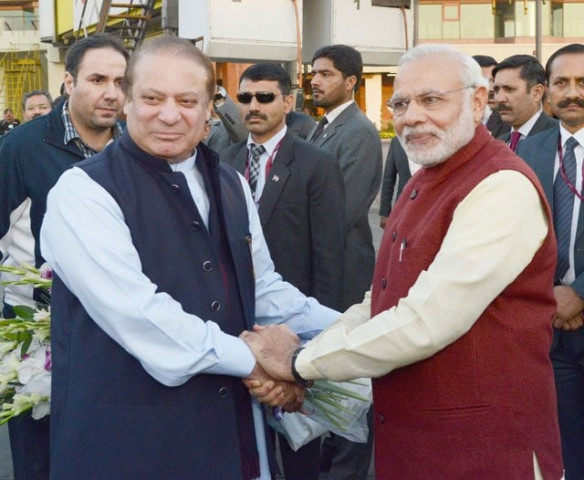Ex-envoy accuses Nawaz of 'pandering to India unilaterally, unconditionally'
Abdul Basit says two of former PM’s foreign affairs advisers Sartaj Aziz and Tariq Fatemi had 'apologetic mindsets'

Pakistan’s former High Commissioner to India Abdul Basit has accused former prime minister Nawaz Sharif of “pandering to India unilaterally and unconditionally”, saying the latter kept silent on the Kashmir dispute to maintain good relations with Indian PM Narendra Modi with whom he held secret talks via an Indian businessman.
“I watched our leader very very closely. I make this assertion on the basis of what I have seen when Nawaz Sharif came for Modi’s inauguration. It was uncalled for to unilaterally free Indian fishermen as a gesture of goodwill. At the meeting in Delhi, Nawaz Sharif kept silent on Kashmir. He did not mention Kashmir even a single time. He also did not seek a meeting with Hurriyat. I had suggested he should," Basit said in an interview with The Wire portal.
He said that the former premier thought that by making unilateral concessions to Modi he would get concessions in return but that did not happen. "As a result, Pakistan’s principal position on Indian Illegally Occupied Jammu and Kashmir (IIOJK), in particular, was poorly defended and even compromised by Sharif."
Read more: Was Nawaz Sharif Really Soft On India?
Basit said Nawaz Sharif wanted to maintain good relations with Modi but did so unilaterally without anything in return. He said both the joint statement of December 2015 and the Ufa joint statement were poorly negotiated by Pakistan. "They made concessions to India without any gain for Pakistan. At the time, I expressed my disagreement with both joint statements."
Basit said Nawaz would meet almost any Indian who wanted to see him and added that the latter was “out to oblige everyone”, adding that he “did not live up to the high standards of the office of the prime minister of Pakistan”.
The former envoy said that two of Nawaz’s closest foreign affairs advisers Sartaj Aziz and Tariq Fatemi had “apologetic mind-sets” and were more keen to accept “Modi’s contentions and work quickly to assuage Modi’s concerns” rather than stand up for Pakistan’s interests.
He said that former foreign secretary Aizaz Ahmad Chaudhry was “brazenly apologetic and improvident” and at the time of the 2015 joint statement “wanted to deliver [to India] no matter what”.
Abdul Basit has also said that Indian businessman Sajjan Jindal played a key role carrying "secret messages" between Modi and Nawaz, on matters ranging from meetings with Hurriyat to the Indian spy Kulbhushan Jadhav case. "Right from the word go, Pakistan has mishandled the Kulbhushan Jadhav case and it’s gradually losing its credibility in the matter," he added.
In an interview last year, former Foreign Office spokesperson Tasneem Aslam had also claimed that not only was Nawaz Sharif soft on India himself, he directed the Foreign Office to not highlight India’s sponsorship of terrorism in Balochistan or mention Kulbhushan Jadhav.
"The short answer is: Yes. There are numerous historical facts to substantiate the claim that in comparison to other Pakistani heads of government, Sharif was exceptionally friendlier towards India," she said.
Tasneem also alleged that Nawaz was soft on India due to his business interests in the country.
The article originally appeared in The Wire.



















COMMENTS
Comments are moderated and generally will be posted if they are on-topic and not abusive.
For more information, please see our Comments FAQ